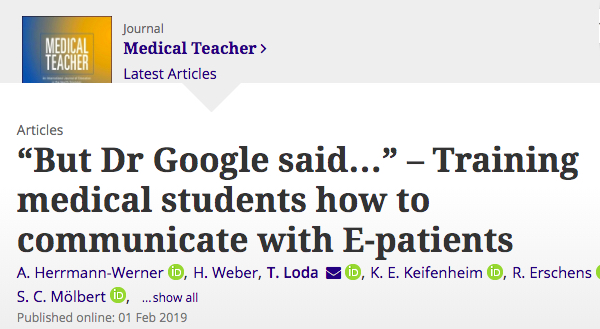I’ve just discovered something I’ve long hoped to see: a training module to teach medical students about e-patients and how to interact with them!
It’s a paper in the journal Medical Teacher: “But Dr Google said…” – Training medical students how to communicate with E-patients. Authored by Anne Herrmann-Werner et al at the University of Tübingen, Germany, it cites the need for young doctors to be trained to deal effectively with e-patients. (An “Nth author” is SPM member Ken Masters, continuing education creator, in Geneva.)
From the abstract:
Purpose: Patients who have access to information online may feel empowered and also confront their physicians with more detailed questions. Medical students are not well-prepared for dealing with so-called “e-patients.” We created a teaching module to deal with this, and evaluate its effectiveness.
Particularly thrilling for me personally was that the study involved the students interacting with SPs who are taught to act like e-patients. (SPs are “standardized patients” – professional actors who are trained to act as patients in different role-play scenarios with the students. The SPs in this study showed the “doctor” an article on a tablet.) The students received training via various video clips:
… specific strategies on how to deal with e-patients (e.g. exploring the patient’s source of information, defuse worst case scenarios, etc.)
Their subsequent performance in SP sessions was videotaped then rated by “two experts.” (I’m dying to know more about that … would they be considered experts in the opinion of our Society’s founders?)
Related resources
Of special interest for people building the body of knowledge about participatory medicine, the paper’s references cite a number of articles that aren’t widely discussed. The introduction of course cites Doc Tom’s e-Patient White Paper, but also cites a 2003 paper in JMIR about e-patients, which in turn cites three papers co-authored by Susannah Fox at Pew and numerous other resources.
Results and next steps
As one would hope, the results reported significant changes in the students’ competence: p<.01 and p<.001. As with every study, our confidence in the results will be boosted substantially when similar studies produce similar outcomes. And I’m dying to see those training videos! From the conclusion:
Within our study period, this effect was lasting; however, further studies should look at long-term outcomes.
Future research will investigate other e-patient topics, such as communication in online encounters, digital navigation on the Internet, and management of one’s digital footprint.
I wrote to Dr Herrmann-Werner, hoping to learn more and establish an on-going dialog with SPM!







Recent Comments